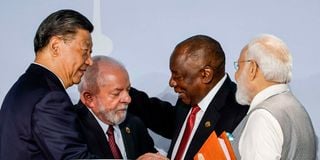Brics expansion benefits Russia, China, not Africa

(From left to right: President of China Xi Jinping, President of Brazil Luiz Inacio Lula da Silva, South African President Cyril Ramaphosa and Prime Minister of India Narendra Modi gesture during the 2023 BRICS Summit at the Sandton Convention Centre in Johannesburg on August 24, 2023.
Brics was initially formed in 2009 by Brazil, Russia, India and China, but South Africa was added to the expanded economic bloc in 2010 to add the voice of Africa. Recently, the organisation announced that it has expanded to include Egypt, Saudi Arabia, Ethiopia, Argentina, United Arab Emirates (UAE) and Iran. But this expansion of membership benefits Russia and China, not Africa.
The post-Cold War international space is replete with power competition. As the only nations with veto powers in the Security Council, Brics allows Russia and China to reinforce the unfair post-World War Two diplomatic order on the Security Council. The two countries can advance their global influence to counter the United States, France and the United Kingdom through Brics.
The expansion of Brics reinforces the “No-Limits Partnership” promulgated by China’s President Xi Jinping and his Russian counterpart Vladimir Putin in Beijing in 2022. This expansion risks having Russia and China use the organisation to entangle Africa in power competitions by forcing African states to take sides in global conflicts.
Further, the expansion brings more developing nations into the institution to provide the illusion of parity when it is clearly fraught with asymmetric power relations. Not all Brics members are equal diplomatically, militarily, or economically. China and Russia see themselves as global empires that predate the domination of international affairs by the US and European Union. The construction of national identity in Beijing and Moscow works to reinforce their prestige and voice in Brics.
This means that African representatives in Brics are outmatched by China and Russia. South Africa has the soft power diplomacy of the Mandela legacy, but it lacks the economic and military strength of either Russia or China.
Including the Middle East nations of Iran, Saudi Arabia and UAE also works against African interests. These three hydrocarbon rich states create a cartel that will leverage its oil in concert with China and Russia to challenge American power in the Middle East. Iran is also motivated to use revolutionary tactics to overturn what it sees as American repression of the Muslim world, and an unfair international order.
Iran has moved closer to Russia and China as its global isolation exacerbated economic challenges at home. Russia found a solid ally in Iran to check American expansion in the Middle East. These alliances outside Africa do not factor in African interests in the wider international geopolitical competition.
Lastly, Brics reinforces autocracy over democracy and can only lead to more democratic backsliding in Africa. Of the five new members, only Argentina can be said to be democratic. Iran is a theocracy, Ethiopia and Egypt are authoritarian and Saudi Arabia and UAE are monarchies. Russia is deeply involved in propping up military regimes across Africa via direct provision of security and intelligence support. China’s non-intervention policy does not bode well for democracy.
Prof Monda teaches political science, international relations and foreign policy at the City University of New York. @dmonda1, davidmonda.com





